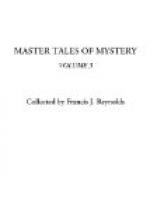“Your friend Prescott interests me, too,” remarked Kennedy, changing the subject quickly.
“Oh, he is no friend of mine,” returned the doctor, fumbling in a drawer of his desk. “But I think I have one of his cards here which he gave me when we were introduced some time ago at Mr. Haswell’s. I should think it would be worth while to see him. Although he has no use for me because I have neither money nor influence, still you might take this card. Tell him you are from the university, that I have interested you in him, that you know a trustee with money to invest—anything you like that is plausible. When are you going to see him?”
“The first thing in the morning,” replied Kennedy. “After I have seen him I shall drop in for another chat with you. Will you be here?”
The doctor promised, and we took our departure.
Prescott’s laboratory, which we found the next day from the address on the card, proved to be situated in one of the streets near the waterfront under the bridge approach, where the factories and warehouses clustered thickly. It was with a great deal of anticipation of seeing something happen that we threaded our way through the maze of streets with the cobweb structure of the bridge, carrying its endless succession of cars arching high over our heads. We had nearly reached the place when Kennedy paused and pulled out two pairs of glasses, those huge round tortoiseshell affairs.
“You needn’t mind these, Walter,” he explained. “They are only plain glass, that is, not ground. You can see through them as well as through air. We must be careful not to excite suspicion. Perhaps a disguise might have been better, but I think this will do. There—they add at least a decade to your age. If you could see yourself you wouldn’t speak to your reflection. You look as scholarly as a Chinese mandarin. Remember, let me do the talking and do just as I do.”
We had now entered the shop, stumbled up the dark stairs, and presented Dr. Burnham’s card with a word of explanation along the lines which he had suggested. Prescott, surrounded by his retorts, crucibles, burettes, and condensers, received us much more graciously than I had had any reason to anticipate. He was a man in the late forties, his face covered with a thick beard, and his eyes, which seemed a little weak, were helped out with glasses almost as scholarly as ours.
I could not help thinking that we three bespectacled figures lacked only the flowing robes to be taken for a group of mediaeval alchemists set down a few centuries out of our time in the murky light of Prescott’s sanctum. Yet, though he accepted us at our face value, and began to talk of his strange discoveries there was none of the old familiar prating about matrix and flux, elixir, magisterium, magnum opus, the mastery and the quintessence, those alternate names for the philosopher’s stone which Paracelsus, Simon Forman, Jerome Cardan, and the other mediaeval worthies indulged in. This experience at least was as up-to-date as the Curies, Becquerel, Ramsay, and the rest.




